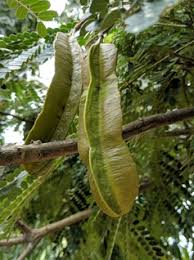Tetrapleura tetraptera, commonly known as Aidan fruit or Prekese, is a tropical plant that belongs to the Fabaceae family. It is native to West Africa and is revered for its culinary and medicinal properties. This plant is characterized by its unique appearance and distinct features
Tetrapleura tetraptera is a medium-sized deciduous tree that can reach heights of up to 20 meters. Its crown is broad and spreading, providing ample shade to the surrounding area. The tree’s bark is rough and gray-brown, with deep furrows and ridges.
The leaves of Tetrapleura tetraptera are alternate, pinnately compound, and about 10-25 cm in length. Each leaf consists of several pairs of leaflets, usually ranging from 5 to 11 pairs. The leaflets are elliptical to oblong in shape and have a glossy dark green color. They provide an attractive backdrop to the tree’s clusters of flowers.
The flowers of Tetrapleura tetraptera are small and white, with a sweet and pleasant fragrance. They are arranged in dense clusters that hang down from the branches. The inflorescences are both attractive and functional, as they attract pollinators such as bees and butterflies.
The most distinctive feature of Tetrapleura tetraptera is its fruits, which are known as Aidan fruits. These large pods are woody and can grow up to 30 cm in length. They have four wings, giving them a quadrangular shape and lending to the plant’s scientific name (tetra meaning four and ptera meaning wing). The pods start out green and turn brown as they mature. Inside, they contain dark brown seeds embedded in a sweet and sticky pulp.
Tetrapleura tetraptera thrives in tropical climates and is commonly found in the rainforests and savannas of West Africa. It is particularly abundant in countries such as Nigeria, Ghana, and Cote d’Ivoire. The tree prefers well-drained soils and can tolerate various soil types, making it adaptable to different environments.
Tetrapleura tetraptera holds cultural significance in many West African communities. Its fruits are used in traditional cuisine to flavor soups, stews, and sauces. Additionally, the plant’s medicinal properties have been valued for generations, with various parts of the plant used to treat a range of ailments.
Read Also: 12 Medicinal Health Benefits of Cinnamomum Parthenoxylon (Yellow Camphorwood)
The Medicinal Health Benefits of Tetrapleura tetraptera (Aidan fruit)

1. Digestive Aid: Tetrapleura tetraptera aids digestion by promoting the secretion of digestive enzymes. It helps alleviate issues like bloating, indigestion, and constipation, ensuring your digestive system operates smoothly.
2. Anti-inflammatory Powerhouse: This plant contains potent anti-inflammatory compounds that can reduce inflammation throughout the body. It’s particularly useful for individuals dealing with joint pain and inflammatory conditions.
3. Blood Sugar Regulation: Tetrapleura tetraptera has been found to help regulate blood sugar levels. It can enhance insulin sensitivity and reduce the risk of sudden blood sugar spikes.
4. Immune System Booster: Rich in antioxidants and vitamins, Tetrapleura tetraptera supports your immune system, helping your body fend off infections and illnesses more effectively.
5. Cardiovascular Health: Regular consumption of Tetrapleura tetraptera is associated with improved heart health. It can help lower blood pressure and cholesterol levels, reducing the risk of cardiovascular diseases.
6. Pain Relief: Traditional medicine has long utilized Tetrapleura tetraptera as a natural pain reliever. It can ease various types of pain, from headaches to menstrual cramps.
7. Respiratory Support: The plant’s aromatic compounds can provide relief for respiratory issues. It’s often used to alleviate symptoms of coughs, colds, and congestion.
8. Skin Nourishment: Tetrapleura tetraptera contributes to healthy skin due to its abundance of vitamins and antioxidants. It helps maintain skin elasticity and may aid in wound healing.
9. Aphrodisiac Properties: In some cultures, Tetrapleura tetraptera is considered an aphrodisiac. It’s believed to enhance libido and improve sexual performance.
10. Anti-microbial Effects: The plant exhibits antimicrobial properties, making it useful in fighting off various infections caused by bacteria and fungi.
Read Also: 15 Medicinal Health Benefits of Terminalia Macroptera (Indian Almond)
The Methods of Usage to Achieve the Provided Health Benefits of Tetrapleura tetraptera (Aidan fruit)
1. Infusions: Prepare a warm infusion by steeping dried Tetrapleura tetraptera in hot water. Drink this tea to enjoy its digestive and immune-boosting benefits.
2. Topical Application: Crushed Tetrapleura tetraptera can be used as a poultice for pain relief or to treat skin issues. Apply it directly to the affected area.
3. Culinary Delight: Incorporate Tetrapleura tetraptera into your cooking to add flavor and health benefits to your meals. It’s often used in soups, stews, and sauces.
4. Herbal Baths: Infuse your bathwater with Tetrapleura tetraptera leaves to create a soothing herbal bath. This can help relax muscles and promote skin health.
5. Tinctures: Prepare a tincture by steeping Tetrapleura tetraptera in alcohol or vinegar. This concentrated form can be taken in small doses for various health benefits.
6. Steam Inhalation: Inhale the steam of boiled Tetrapleura tetraptera leaves to relieve respiratory issues. This method can help clear congestion and ease breathing.
7. Compress: Soak a cloth in a strong infusion of Tetrapleura tetraptera and apply it as a compress to the skin. This can help alleviate pain and inflammation.
8. Herbal Oil: Infuse oil with Tetrapleura tetraptera leaves or seeds to create an herbal oil. This oil can be used for massage or as an ingredient in skincare products.
The Side Effects of Using Tetrapleura tetraptera Medicinal Plant
1. Stomach Upset: Excessive consumption of Tetrapleura tetraptera may lead to stomach discomfort, including bloating, gas, and indigestion.
2. Allergic Reactions: Some individuals may be allergic to Tetrapleura tetraptera. Allergic reactions could manifest as skin rashes, itching, or even more severe symptoms like difficulty breathing.
3. Interference with Medications: Tetrapleura tetraptera may interact with certain medications. If you’re on medication, consult a healthcare professional before incorporating it into your routine.
4. Blood Sugar Effects: While it can help regulate blood sugar, individuals with diabetes should monitor their levels closely, as Tetrapleura tetraptera might affect glucose levels.
5. Pregnancy and Breastfeeding: Pregnant and breastfeeding women should exercise caution. Limited research is available on its safety during these periods.
6. Gastrointestinal Distress: Some individuals might experience gastrointestinal discomfort when using Tetrapleura tetraptera, especially if consumed in excessive amounts.
7. Hypotension: Due to its potential blood pressure-lowering effects, individuals with low blood pressure should be cautious when using Tetrapleura tetraptera.
Nutritional Value of Tetrapleura tetraptera (Aidan fruit)

1. Carbohydrates: Tetrapleura tetraptera fruits are rich in carbohydrates (43.18–49.06%), serving as a primary energy source and supporting metabolic functions in traditional diets.
2. Proteins: The fruits contain moderate protein levels (7.44–17.50%), essential for tissue repair, muscle growth, and overall nutritional balance.
3. Lipids: With crude lipid content (4.98–20.36%), these fats contribute to energy provision and absorption of fat-soluble vitamins.
4. Dietary Fiber: High crude fiber (17–20.24%) promotes digestive health, aids in bowel regularity, and helps prevent constipation.
5. Saponins: Abundant saponins (16.33–17.78%) provide potential antimicrobial and anti-inflammatory benefits, enhancing the fruit’s medicinal value.
6. Alkaloids: Present at 1.88–2.22%, alkaloids contribute to antimalarial and analgesic properties, supporting traditional therapeutic uses.
7. Tannins: Low levels of tannins (0.16–0.25%) offer astringent effects while maintaining nutritional accessibility without excessive interference.
8. Phenols: Phenolic compounds (0.04–0.13%) act as antioxidants, protecting cells from oxidative damage and reducing chronic disease risk.
9. Calcium: The fruits provide calcium (182.11–200.02 mg/100g), vital for bone health, muscle function, and nerve signaling.
10. Potassium: High potassium (251.22–288.62 mg/100g) supports heart health, blood pressure regulation, and electrolyte balance.
These nutritional elements make Tetrapleura tetraptera a valuable spice and medicinal fruit, particularly for its energy provision, digestive support, and antioxidant properties in West African cuisines and remedies.
Scientific Evidence and Case Studies on Tetrapleura tetraptera (Aidan fruit)
1. Ojewole (2005): This study examined the aqueous fruit extract in rats with egg albumin-induced paw edema and streptozotocin-induced diabetes. The extract significantly reduced inflammation and lowered blood glucose levels in a dose-dependent manner (50–800 mg/kg), confirming its anti-inflammatory and hypoglycemic effects (Ojewole, J. A. O., 2005).
2. Kuate et al. (2015): In high-carbohydrate, high-fat diet-induced obese and type 2 diabetic rats, the hydroethanolic fruit extract (50–200 mg/kg) attenuated obesity, improved insulin sensitivity, reduced hyperlipidemia, and lowered blood pressure, demonstrating benefits for metabolic syndrome (Kuate, D., et al., 2015).
3. Atawodi et al. (2014): Methanolic leaf extract (100–300 mg/kg) in alloxan-induced diabetic rats reduced hyperglycemia, oxidative stress, and markers of kidney damage, supporting its role in managing diabetes complications (Atawodi, S. E., et al., 2014).
4. Oboh et al. (2015): The phenolics fraction of the fruit inhibited xanthine oxidase and Fe2+-induced lipid peroxidation in rat kidney, liver, and lung tissues in vitro, indicating potential for preventing hyperuricemia and oxidative damage (Oboh, G., et al., 2015).
5. Saague et al. (2014): Water-ethanol fruit extracts protected against CCl4-induced liver injuries in rats by reducing oxidative stress and inflammation, highlighting hepatoprotective benefits (Saague, P. W. K., et al., 2014).
Frequently Asked Questions About Tetrapleura tetraptera (Aidan fruit)
1. What is Tetrapleura tetraptera used for?
Aidan fruit is used as a spice in West African soups and stews, and in traditional medicine for treating diabetes, inflammation, hypertension, and malaria.
2. Is Tetrapleura tetraptera safe to consume?
Yes, in culinary amounts it’s safe, but extracts should be used cautiously; pregnant women and those with medical conditions should consult a doctor due to potential interactions.
3. How does Tetrapleura tetraptera benefit health?
Its flavonoids, saponins, and phenolics provide antioxidant, anti-inflammatory, and antidiabetic effects, helping manage blood sugar, reduce oxidative stress, and support liver health.
4. What is the nutritional content of Aidan fruit?
It’s rich in carbohydrates, proteins, fiber, minerals like calcium and potassium, and phytochemicals such as saponins and alkaloids for energy and health support.
5. Can Tetrapleura tetraptera help with diabetes?
Studies like Kuate et al. (2015) show it lowers blood glucose and improves insulin sensitivity in diabetic models, supporting traditional antidiabetic uses.
6. How is Tetrapleura tetraptera used in traditional medicine?
Fruits are boiled into decoctions for hypertension, inflammation, and postpartum care; leaves treat convulsions and fevers in African herbal practices.
7. Are there side effects of Tetrapleura tetraptera?
Mild digestive upset may occur with overuse; high doses could affect blood pressure or interact with diabetes medications, so moderation is advised.
8. Can Tetrapleura tetraptera be grown at home?
Yes, it thrives in tropical climates with well-drained soil and full sun, but it’s a large tree requiring space; suitable for home gardens in West Africa.
Do you have any questions, suggestions, or contributions? If so, please feel free to use the comment box below to share your thoughts. We also encourage you to kindly share this information with others who might benefit from it. Since we can’t reach everyone at once, we truly appreciate your help in spreading the word. Thank you very much for your support and for sharing!
Disclaimer: This article is for educational and informational purposes only. The health benefits described are based on scientific research and traditional knowledge. They are not a substitute for professional medical advice, diagnosis, or treatment. Always consult a healthcare professional before using any herb or natural remedy for medical purposes.
Read Also: List of Problems Confronting Livestock Production

